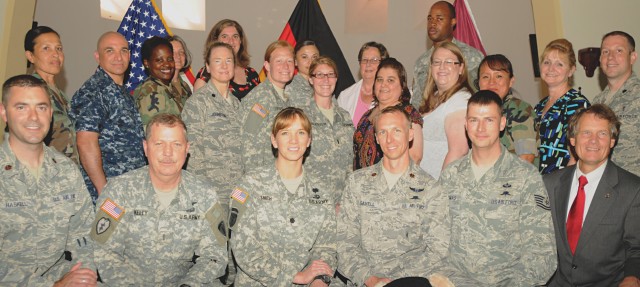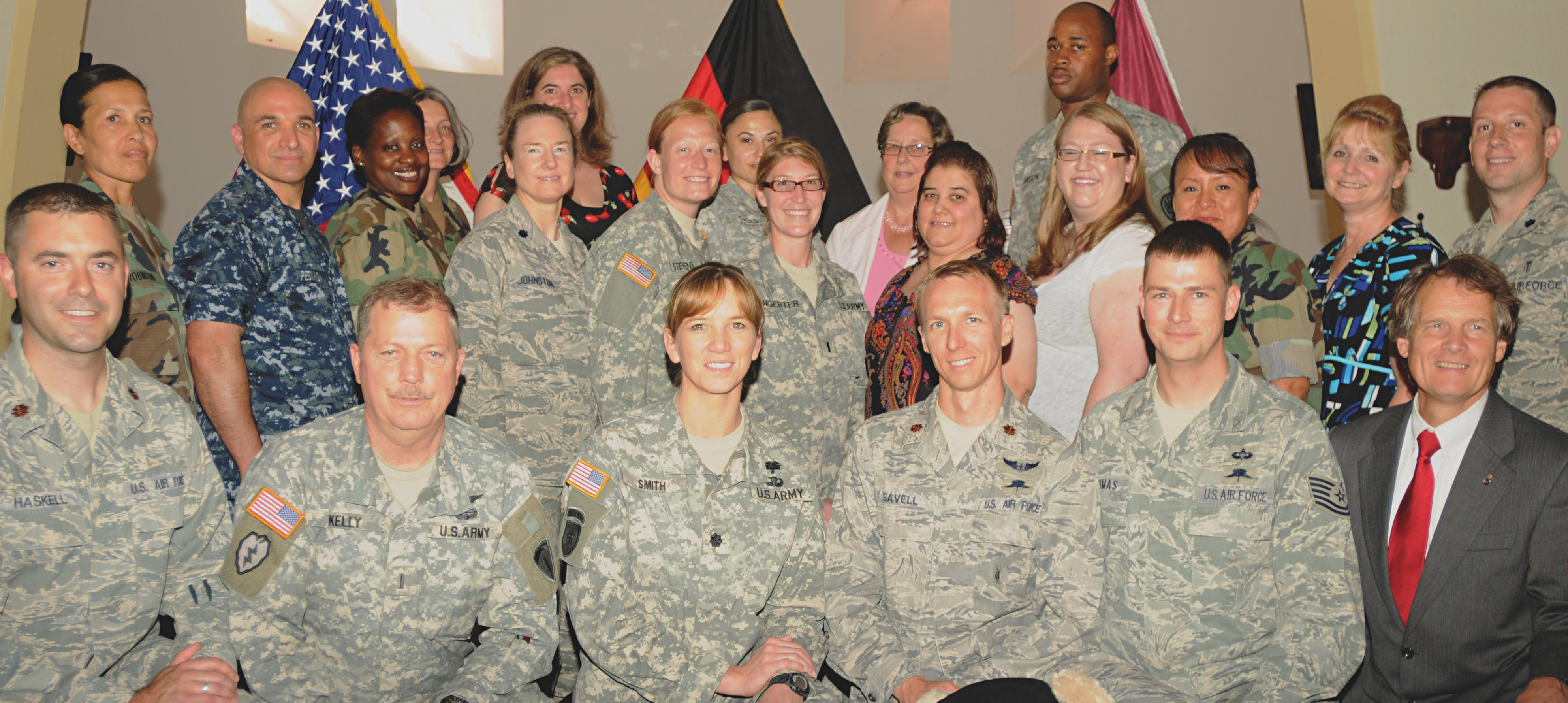
LANDSTUHL, Germany-U.S. Army Europe Reintegration and Reintegration Support teams were recognized for completing four missions in the last 12 months that provided a successful transition back to normal life after the strains of captivity for 17 isolated, missing, detained or captured personnel.
"Reintegration is so critical for recovered personnel who have suffered a traumatic experience to get them the care they need and deserve," said Col. (P) Nadja West, commander of Europe Regional Medical Command, who presented the awards June 30 at Landstuhl Regional Medical Center. She praised the teams for their efforts and how they demonstrated the true spirit of ERMC values: "One Team-Dignity and Respect."
LRMC Commander Col. John M. Cho said he was proud of what the teams have accomplished. "There really is a lot of work involved in the reintegration process. This team put tremendous effort in pulling it all together, managing to flawlessly execute four missions. Their collaboration and teamwork was remarkable," Cho said. "They have set the standard for Phase II reintegration, and now are viewed as subject matter experts by Department of the Army."
Reintegration is a detailed, three-phased plan for returning isolated, missing, detained or captured individuals back to duty. The first phase is the initial reception. In Phase II, theater transition, returnees receive medical and psychological care, tactical and intelligence debriefings, legal services, public affairs guidance and spiritual support. The last phase is considered service reintegration where the returnee returns to duty.
"Reintegration and Reintegration Support teams consist of Army, Air Force, and Navy service members and civilians, each with a specific skill or expertise to support the reintegration process," said USAREUR Personnel Recovery Officer Chief Warrant Officer 5 Mike Kelly. In addition to himself, Kelly said the USAREUR Reintegration Team includes a team chief, survival, evasion, resistance and escape psychologists and debriefer, and representatives from Medical, Intelligence, Staff Judge Advocate, Chaplain, and Public Affairs departments. The Reintegration Support Team consists of various hospital and administrative staff designated by the team chief to assist in the mission.
"The hospital staff and team members performed exceptionally well and are very deserving of their recognition," Kelly said. "Reintegration missions do not occur frequently, but when they do, they require immediate notification and response from the reintegration team," he said.
Lt. Col. Rachele M. Smith, chief of LRMC Patient Administration Division and the Reintegration Team chief, has led the Reintegration Team for two years. "We are fortunate to have such outstanding and dedicated professionals on our team, who are passionate about what they do. Different branches of service, different skills and expertise, all coming together with one centric focus - the needs of the patients," she said. "All team members know just how vital the care they provide to the patients is in helping them cope with the traumatic experiences they just went through."
Reintegration Support Team member 1st Lt. Heather Bangerter said she loves being a part of the reintegration process. "Knowing what these people have gone through, it's my way of giving back to them," she said. "If I can get them to give me their first smile when they get off the plane, I'm thrilled."
U.S. European Command has designated USAREUR as the lead component for Reintegration Phase I and II at LRMC, according to Kelly. "We take our role seriously, knowing the importance of reintegration - not only in terms of multi-service, but also multi-nation. We definitely want to share our knowledge and success with our partners and Allies as they may encounter personnel recovery missions when they are downrange," he said.
The USAREUR Personnel Recovery Mobile Training Team recently traveled to Slovakia to conduct SERE and PR training for the 21st Mixed Mechanized Battalion as part of the unit's pre-deployment training. Kelly said the unit, which will deploy to ISAF in Afghanistan, was very receptive and appreciative of this type of training.
-30-

Social Sharing